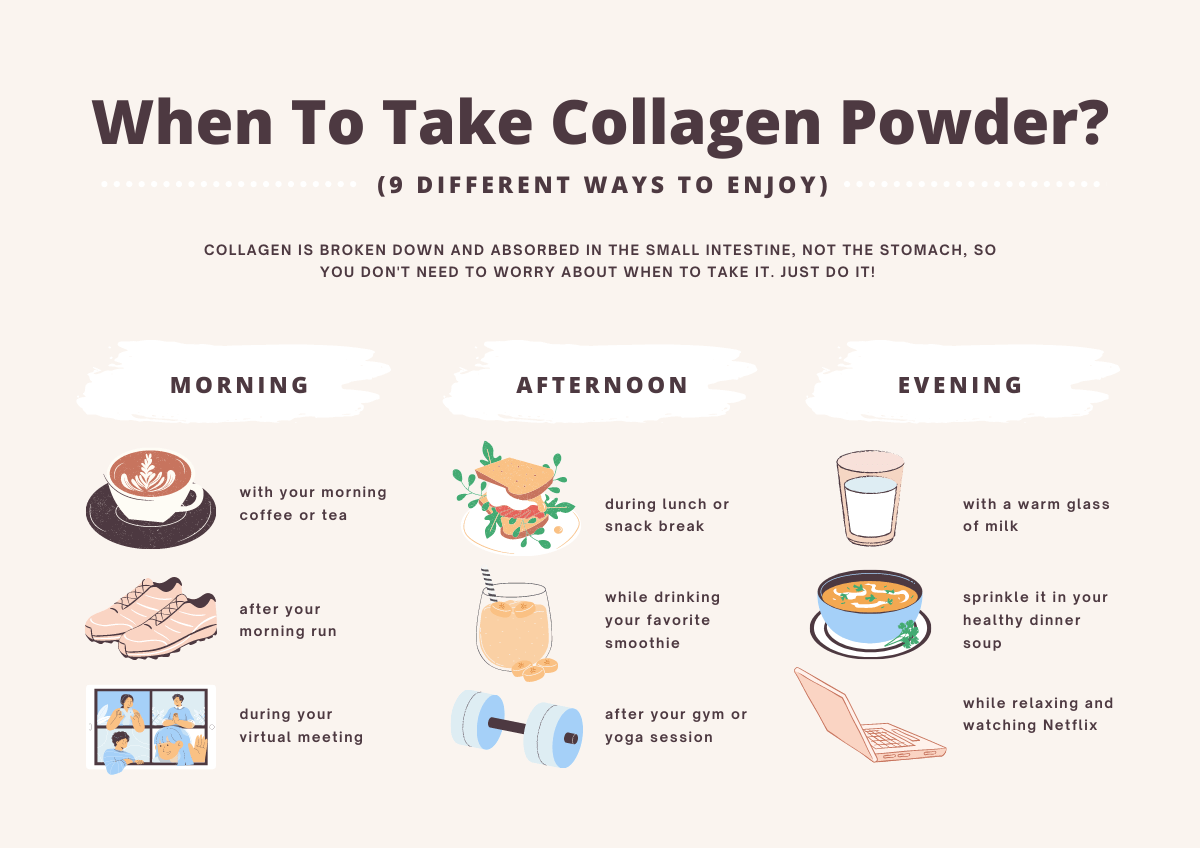Have you taken a good look in the mirror lately? See any wrinkles and lines that weren’t there the last time you looked? If so, you may need to start taking collagen soon. But is there a specific age when you need to start taking collagen powder? If yes, is it best to take it in the morning, afternoon, or evening? Do you take it on an empty or full stomach? Stay tuned as we answer these important questions below!
Table of Contents
Are you eating enough collagen?
Collagen comprises about a quarter of protein mass in the body (1). It’s a rich source of functional peptides and contributes to skin elasticity, recovery and strengthening of cartilage tissue, tendons, and ligaments. It also helps reduce joint pain and increase bone mineral density (2).
Ideally, you should be getting enough collagen from protein-rich food sources, such as egg whites, chicken, fish, and bone broth. But we understand, not everyone’s got the time nor the inclination to eat healthy food!
So, how do you ensure you get enough collagen? This is where collagen in convenient powder or pill form comes in handy.
When to start taking collagen powder?
Before we answer this question, let me just state that there’s nothing wrong with getting old. Many people actually look more attractive as they age. But if you’re not comfortable with the visible signs of aging, then taking collagen supplements may help.
To know when to start taking collagen, we first need to understand that the aging process is affected by both intrinsic and extrinsic factors. Healthy, young skin is firm, unblemished, and has a smooth outer layer that protects you from your external environment.
But as part of intrinsic aging, starting at about 20 years of age, collagen production starts declining at about 1% per year (3). As a result, skin thickness also decreases by about 6.4% per decade (4). Yes, these may seem like rookie numbers. But as the years go by, the skin becomes thinner and more fragile, especially on the face, neck, upper chest, hands, and forearms. By the time you hit 30, the fine lines and wrinkles become more noticeable and perhaps even a bit alarming.
On the other hand, extrinsic aging is brought about by external factors that contribute to and speed up the aging process. Sun exposure, pollution, alcohol, and cigarette smoking are all culprits, making the skin look rough, uneven, and old. In many cases, cumulative exposure to these factors can even progress to various forms of skin cancer (5).
So, to answer the question, you can start taking collagen as soon as you start noticing fine lines and wrinkles on your face. But as the saying goes, prevention is better than cure, so taking collagen earlier should also help.
The earlier you start, the more you delay the appearance of unsightly lines on your skin. Plus, you also get a headstart when it comes to experiencing the benefits of collagen supplements!

When should I take collagen? Morning or night?
You’ll find plenty of conflicting advice on the web regarding this question. Some people say morning is best, while others say taking it at dinnertime helps them with sleep. But there’s no scientific evidence that points to either time as being the “best” time.
For best results, you should check the product label. It should have instructions there on how to take your collagen. For our Intelligent Labs Multi Collagen Powder, we recommend taking one serving (one scoop) twice a day, one in the morning and another in the evening. But if you were only to take one serving a day, either morning or night is fine.
Should you take collagen on an empty stomach?
Truth be told, it doesn’t really matter whether you take collagen on an empty or full stomach. Why? Because collagen is a protein, and protein is broken down and absorbed in the small intestine, not in the stomach (6). So, take your collagen powder when it’s most convenient for you!
How often should you take collagen powder?
It depends on the brand and their recommended serving size since there’s no official recommended daily allowance for collagen. For our Collagen supplement, we recommend taking one serving two times daily, e.g. one at breakfast and another one at dinner.
For long-lasting results, make collagen a part of your daily skincare routine!
What happens if you take more than the recommended serving?
Hopefully, nothing. Collagen is generally considered a safe and nontoxic supplement. In one study, the most adverse side effects reported were mild to moderate stomach complaints (7). So, if you take too much, a trip to the toilet may be necessary! But, of course, before you experiment to find your max collagen threshold, speak with your doctor first.
How do you take collagen powder?
Most brands claim to have a neutral taste, so you can mix your collagen powder with anything you like. You can take it with water, tea, coffee, or any other beverage or soup. Just take note that collagen won’t make you feel fuller. It’s just powder, after all. But if you mix it in with something filling like warm soup, then that will fill you up pretty quickly!
If you’re planning to enjoy a cold, collagen-infused drink, add the powder to room temperature liquid first. Stir until the collagen powder is dissolved. Then add ice to cool. Enjoy!
References
(1) Shoulders, Matthew D, and Ronald T Raines. “Collagen structure and stability.” Annual review of biochemistry vol. 78 (2009): 929-58. doi:10.1146/annurev.biochem.77.032207.120833
(2) Paul, Cristiana et al. “Significant Amounts of Functional Collagen Peptides Can Be Incorporated in the Diet While Maintaining Indispensable Amino Acid Balance.” Nutrients vol. 11,5 1079. 15 May. 2019, doi:10.3390/nu11051079
(3) “Why Does Skin Wrinkle with Age? What Is the Best Way to Slow or Prevent This Process?” Scientific American, 26 Sept. 2005, www.scientificamerican.com/article/why-does-skin-wrinkle-wit.
(4) Farage, Miranda A et al. “Characteristics of the Aging Skin.” Advances in wound care vol. 2,1 (2013): 5-10. doi:10.1089/wound.2011.0356
(5) Tsatsou, Fragkiski et al. “Extrinsic aging: UV-mediated skin carcinogenesis.” Dermato-endocrinology vol. 4,3 (2012): 285-97. doi:10.4161/derm.22519
(6) Wikipedia contributors. “Small Intestine.” Wikipedia, 28 Apr. 2021, en.wikipedia.org/wiki/Small_intestine.
(7) Van Vijven, J P J et al. “Symptomatic and chondroprotective treatment with collagen derivatives in osteoarthritis: a systematic review.” Osteoarthritis and cartilage vol. 20,8 (2012): 809-21. doi:10.1016/j.joca.2012.04.008




